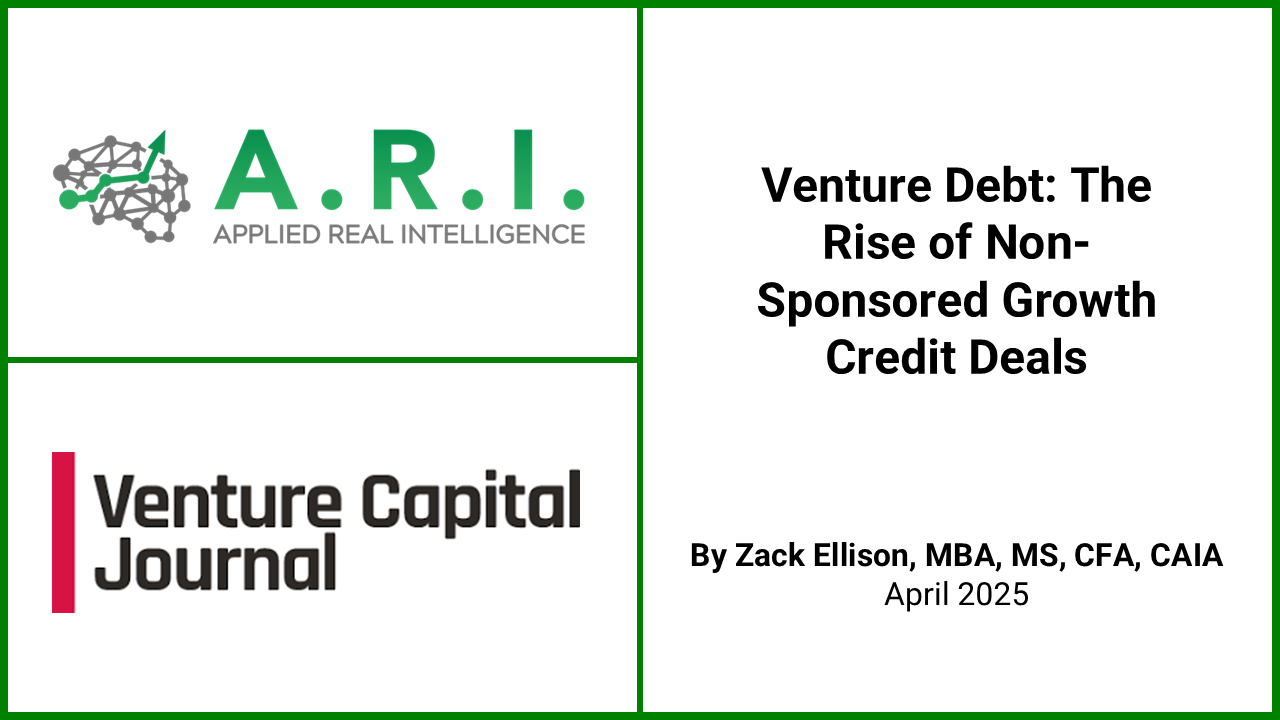
Venture Debt: The Rise of Non-Sponsored Growth Credit Deals
In part 20 of his series on venture debt, Zack Ellison from Applied Real Intelligence examines the emerging appeal of lending to non-sponsored, bootstrapped companies.
While venture capital has long dominated the start-up funding narrative, a growing segment of the founder community is pushing back and prioritizing control, sustainability and long-term value over blitz-scaling and dilution.
Traditional venture capital offers capital, connections, and credibility, but it often demands significant concessions in control and economics. Founders frequently surrender board seats, decision-making authority and large portions of ownership to fund aggressive growth mandates that may not align with their company’s long-term vision.
Increasingly, entrepreneurs are rejecting this trade-off. Instead, many are choosing to bootstrap or utilize minimally dilutive growth credit to retain strategic control, preserve equity ownership and build durable, profitable businesses on their own terms.
In recent articles, we explored the strengths and weaknesses of VC-backed deals and outlined how lenders can evaluate VCs to mitigate risks in sponsor-backed deals. This month, we turn our attention to the other side of the coin: the increasingly attractive, yet often overlooked, world of non-sponsored growth credit deals.
For growth lenders, this founder-first shift opens a compelling and timely opportunity. Non-sponsored companies are often more disciplined, more aligned and more attractive from a credit perspective. In the sections that follow, we explore why this emerging segment is quickly becoming a prime hunting ground for lenders seeking stronger downside protection and higher risk-adjusted returns.
Better Deal Terms for Lenders
Unlike sponsor-backed deals, where the presence of a marquee VC can tilt negotiations and squeeze pricing, non-sponsored deals often come with more room to negotiate structures that reflect the actual risk-return profile of the business, rather than the preferences of a powerful equity investor.
These companies typically aren’t competing for capital in overhyped markets and their founders often view debt as a long-term part of their capital structure rather than a bridge to the next valuation milestone. As a result, lenders often achieve more favorable terms, including higher interest rates, stronger covenants, enhanced security packages and greater warrant coverage.
Fundamentals-Based Underwriting
Without the involvement of a venture sponsor, the underwriting process can be more straightforward. There’s no need to parse out whether the deal was driven by a VC’s strategic interests or to rely on the sponsor’s reputation as a proxy for company quality. The focus returns to fundamentals, including cash flow visibility, capital efficiency, product-market fit and the strength of the leadership team. This simplifies due diligence and keeps attention on the company’s actual performance.
Less Competitive Market
Sponsor-backed transactions are easy to find through platforms like PitchBook or CB Insights, and frequently attract intense competition. Non-sponsored opportunities, by contrast, tend to fly under the radar. They aren’t broadly marketed and don’t flow through traditional venture networking channels. As a result, lenders who have mastered the art of sourcing high-quality deals often uncover gems that offer better risk-adjusted returns than comparable VC-backed companies.
Freedom to Grow Quietly
Non-sponsored companies benefit from operating without the glare of media attention or investor pressure. They can make mistakes quietly, learn efficiently, iterate more freely and evolve without worrying about narrative shifts or public perception. They aren’t subject to public scrutiny that comes with splashy venture rounds and escalating valuations, so they can focus on building a strong operating company.
No Down-Round Risk
One of the most significant risks in sponsor-backed ventures is the down round, which can reset cap tables, demoralize teams and trigger investor pullback. Non-sponsored companies sidestep this issue entirely. Without inflated valuation expectations or dependency on external capital, they’re free to grow at their own pace, focused on building intrinsic enterprise value. This stability can be highly attractive to lenders, particularly in a market where overcapitalized companies are struggling to raise follow-on funding. Ironically, the absence of VC backing – which used to be seen as a sign of weakness – can lead to better long-term outcomes for both founders and lenders.
Accountable Founders
Founders who build without venture backing often approach decision-making with a high degree of discipline and operational focus. Working with limited resources – primarily their own capital, contributions from close networks or early customer revenue – these entrepreneurs tend to be highly mindful of opportunity cost. Many adopt a pragmatic, metrics-driven mindset and prioritize efficiency over optics. While every founder is different, this approach often results in thoughtful, long-term partnerships with lenders who value careful capital stewardship and a clear path to sustainable growth.
Disciplined Cash Management
Without the cushion of large equity raises, non-sponsored founders are typically more conservative in their approach to cash. They treat capital as a strategic asset, not a blank check. These founders manage burn rates conservatively, invest with intention and often stretch every dollar further than their venture-backed peers. This discipline reduces the risk of overextension and enhances the probability that debt will be deployed efficiently to drive measurable outcomes.
New Era of Lending Opportunities
As we emerge from the excesses of the 2020-2022 VC bubble, the appeal of non-sponsored deals continues to grow. Many overcapitalized startups of that era are now facing harsh realities: reset valuations, reluctant investors, limited paths to additional capital and no exit in sight.
In contrast, capital-efficient, founder-led companies that prioritized sustainability are now in stronger relative positions. For venture lenders, this marks the beginning of a new era where the best deals don’t come from the highest-profile companies, but from those who have quietly built strong, lean businesses on their own terms. Lending to these unsponsored companies isn’t just a contrarian move; it’s often a smarter one.
Zack Ellison is the Founder and Managing Partner of Applied Real Intelligence and Chief Investment Officer of the A.R.I. Senior Secured Growth Credit Fund. Send comments or questions to zellison@arivc.com and visit A.R.I.’s website at www.arivc.com.